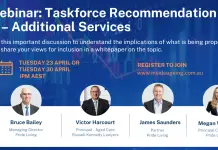The Taskforce tasked with reviewing funding arrangements for aged care has presented a significant shift away from the idea of implementing an aged care tax levy, as suggested by the Aged Care Royal Commission.
Instead, the report recommends a model where individuals accessing care should contribute more based on their personal wealth. This recommendation comes against the backdrop of a substantial increase in aged care expenditure, expected to reach $42 billion by 2026-27, driven by demographic changes and rising expectations of quality care.
Despite calls for an aged care tax levy, the Taskforce rejected this proposal, emphasising the government’s central role in funding aged care while highlighting intergenerational equity concerns.
The report suggests making aged care fees fairer, simpler, and more transparent, with individuals contributing more if they have the means, potentially based on age pension status or home ownership.
However, specific metrics for determining contributions and implementation timelines remain unspecified. Workforce concerns, including staffing shortages and retention issues, were acknowledged but deemed beyond the review’s scope, inviting criticism given the significance of workforce challenges in the sector and no solution in sight.
The Taskforce also highlights the need for providers to develop and scale innovative care models, invest in technology and conduct research into best practices.
Early indications suggest overwhelming support from the aged care sector for the recommendations, with one of the largest providers St Vincent’s Care calling for “adoption of the recommendations in full.”
“Asking older Australians with means to contribute to their accommodation and daily costs of life – while government remains the majority funder of their care – is fair and meets the community’s expectations”
Lincoln Hopper, CEO, St Vincent’s Care
While the government is set to consider the Taskforce’s recommendations, concerns linger over the quality of aged care, with workforce challenges contributing to existing pitfalls. The report’s emphasis on individual contributions based on personal wealth marks a departure from previous discussions on funding models, raising questions about the potential implications for older Australians accessing care.
Despite the taskforce’s acknowledgment of workforce concerns, the lack of concrete recommendations on addressing these issues highlights ongoing challenges in ensuring a sustainable and proficient aged care workforce.
As the government deliberates on the Taskforce’s recommendations, the aged care sector awaits potential reforms aimed at balancing financial sustainability with equitable access to quality care. With demographic shifts driving increased demand and expectations for aged care services, the Taskforce’s proposals highlight the need for comprehensive and forward-thinking approaches to funding and workforce challenges in the sector.










